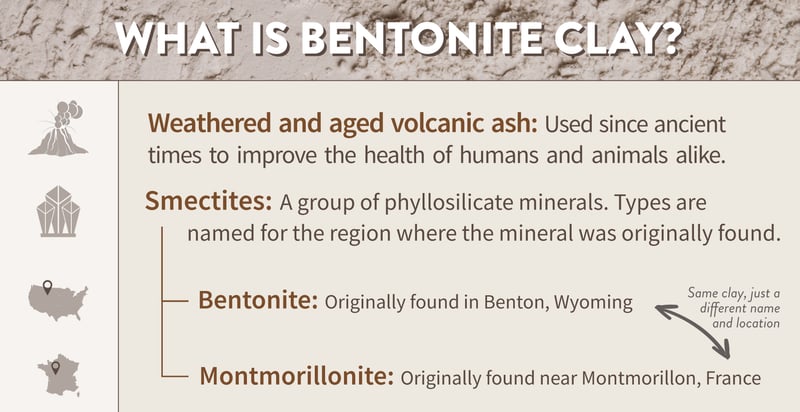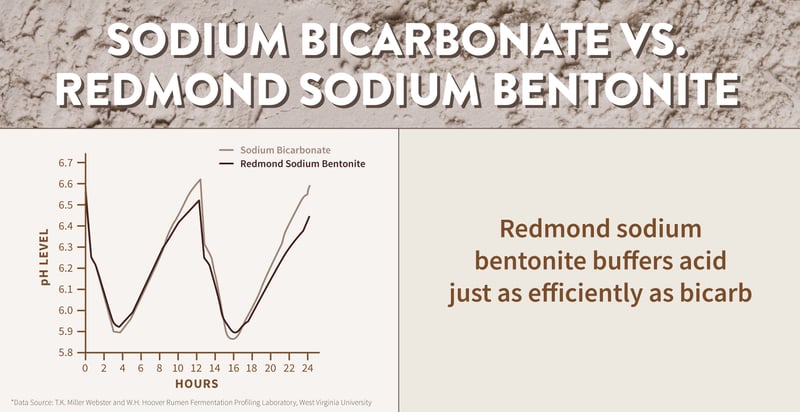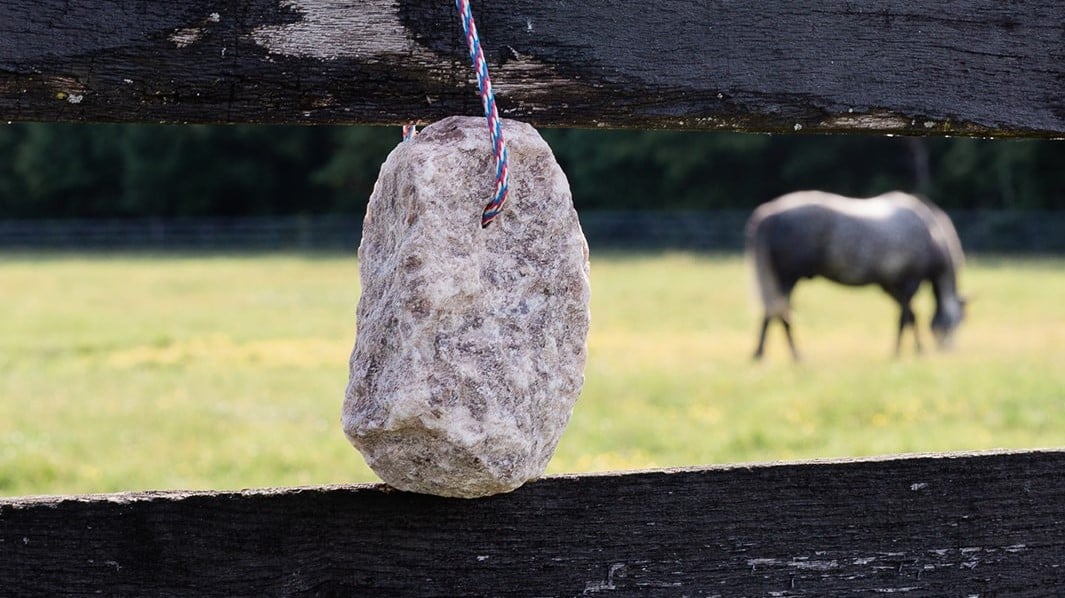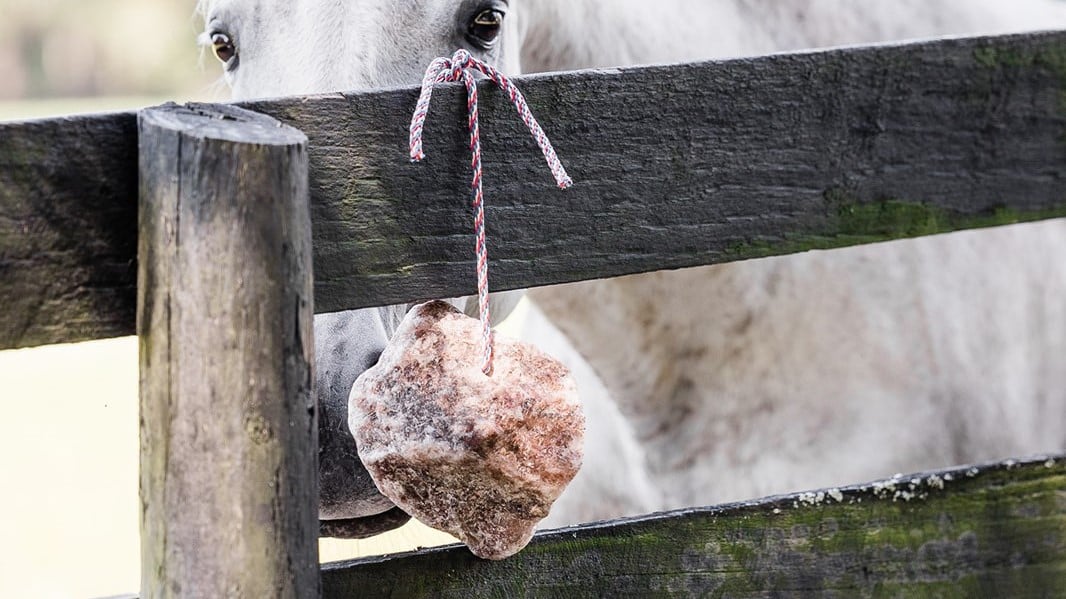Is Bentonite Clay Safe and Beneficial for My Horse?
September 17, 2024
Is Bentonite Clay Safe and Beneficial for My Horse?
Many horse owners have discovered the health benefits of bentonite clay for their horses. In fact, both humans and animals have used this amazing clay for centuries to treat various maladies. But what exactly is it, what does it do, and how can it improve equine health?
This article will help you better understand the properties of bentonite clay, its efficacy and safety—and may also help you feel more confident using it inside and out on your horse.
Let’s get the scoop on bentonite—the clay that’s literally as old as dirt—so you and your equine partner can start experiencing its valuable health benefits.
What is Bentonite Clay?
Bentonite, also known as montmorillonite, is an age-old healing clay. It has incredible—and incredibly diverse—curative properties. Some call it Mother Nature’s pharmacy. We call it the “clay of a thousand uses.”
Bentonite and montmorillonite belong to a family of clay minerals called smectites. They form when volcanic ash weathers and ages—usually in seawater—and are found in deposits throughout the world.
Both bentonite and montmorillonite are named after the geographic regions where they were originally found: Benton, Wyoming, and Montmorillon, France. The clays are essentially the same and their names are used interchangeably. We’ll do the same throughout this article!

Sodium vs. Calcium Bentonite Clay
There are two primary forms of bentonite: sodium and calcium. Both contain crystalline clay minerals, a greater amount of either sodium or calcium, and a spectrum of many other trace minerals.
So, what is the difference between sodium and calcium bentonite? Calcium bentonite is a non-swelling clay, while sodium bentonite has a high swell capacity. Some sodium bentonite can absorb and expand up to 20 times its original dry volume size when exposed to water, allowing it to draw pollutants into its internal structure.
The two clays also have slightly different pHs. Calcium bentonite is neutral, with a pH of 7-8. Sodium bentonite is more alkaline, with a pH of 9-10, giving it the ability to neutralize acidic environments.
Unique Physical Properties of Bentonite Clay
Through the ages, humans and animals have been drawn to clay both for its external and internal therapeutic abilities. Bentonite has three unique physical properties that provide health-promoting benefits: the ability to absorb large amounts of moisture, adsorb toxins, and deliver dozens of essential micronutrients. Let’s look closer at why these properties are important for horse health.
Absorption
Bentonite, particularly sodium bentonite, is a swelling clay. It excels at absorbing because of it's many microsopic plates with large surface areas that adhere together when wet. When used externally—such as in a horse poultice, wound cream, or hoof pack—it effectively draws out excess fluid, infection, bacteria, toxins, and contaminants. It also improves circulation to the area, increasing blood flow and oxygen to cells and speeding up healing.
Adsorption & Detoxification
Because of its fine particle size and negatively charged ions, bentonite also has the uncanny ability to bind to and eliminate heavy metals, damaging toxins and pollutants inside the body. (For example, those unwanted and often undetected aflatoxins and mycotoxins hiding in horse feed.)
This National Institutes of Health (NIH) article notes, “Animal feeding studies have demonstrated that clay additives, such as bentonites, can bind aflatoxins in ingested feed and reduce or eliminate the toxicity.”
When clay is ingested, it travels through the body looking for bad guys—toxins, impurities, or pathogens—to bind to. Clay particles are like magnets. They have a negatively charged surface, while most toxins and impurities carry a positive charge.
That's why clay is constantly hunting for that other half—positively charged impurities or toxins—to bind to, to become charged. Once united, those molecules stay together, allowing toxins to be carried all the way out of the body. This process is known as “adsorption.”
Micronutrients
Bentonite clay has a third valuable characteristic: it’s packed with beneficial trace minerals. That’s because its absorbing ability allows it to soak up and capture valuable nutrients in the environment where it lives.
For example, the sodium bentonite in Redmond Daily Gold horse digestive supplement was born from volcanic ash that settled into an ancient seabed in Utah, USA. It contains a complete spectrum of bioavailable sea minerals horses need for better health. (See the complete list of trace minerals in Redmond bentonite clay.)
Bentonite Clay Benefits for Horses
We’ve covered the unique physical properties of bentonite. Now let’s explore the health benefits horses can receive from ingesting clay or having it applied topically.
Internal Uses and Benefits
Humans and animals have intentionally eaten earthy substances like clay since ancient times. Every horse eats soil and clay in some amount every day. It’s a natural part of their diet! But some horses specifically seek it out. Ever wondered why?
This NIH study sheds some light. The study found when bentonite is ingested internally, it can:
- Treat digestive disorders and diarrhea
- Improve gut flora activity
- Increase nutrient absorption
- Boost immune response
- Improve renal health and kidney function
- Regulate thyroid health
- Act as a natural antibiotic for some harmful bacteria strains
- Reduce the bioavailability of aflatoxins and mycotoxins
- Reduce metal poisoning
Redmond customers who use Daily Gold (pure sodium bentonite clay digestive supplement) for horses also report it:
- Relieves symptoms of ulcers in horses
- Improves coat and hoof health
- Reduces cinchiness when saddling
- Helps horses gain and maintain a healthy weight
- Increases calm and focus
Bentonite Buffers Acid & Improves Digestion
A 2021 study published in Frontiers in Veterinary Science showed bentonite mineral clay buffered acid and improved diverse microbiome in dairy cows fed a high-starch diet. These diets, which are rich in grains, increase gut dysbiosis and systemic health disorders in horses and cows.
A study by West Virginia University found that Redmond sodium bentonite neutralizes hindgut acid in cattle just as effectively as sodium bicarbonate, with these added health benefits:
- Supports beneficial microbial colonies needed for digestion
- Improves fiber digestion
- Improves carbohydrate absorption
- Reduces rumen ammonia levels

External Uses and Benefits
Bentonite clay is also used externally on horses. Mix it with water to make a paste or poultice or purchase it already hydrated and mixed. Apply the clay generously to your horse’s skin or hooves to:
- Help heal lesions and cuts and prevent proud flesh
- Soothe burns
- Draw infection from open wounds
- Reduce swelling in horses’ legs
- Relieve insect bites and stings
- Heal hoof abscesses
What Are the Dangers of Bentonite Clay in Horses?
We’ve covered some of the valuable health benefits of bentonite clay for horses. But are there any dangers or negative side effects to be aware of?
While there are no known serious side effects to using therapeutic amounts of bentonite clay, some people and animals have gotten sick from consuming too much. Those instances are rare, however, when following recommended guidelines for use.
This advice from the previously cited NIH study seems fair: "Generally, it sounds that like any other drug, big doses of bentonite can have some side effects and thereby it is necessary to use a therapeutic dose of this mineral in diseases."
If you have concerns about feeding clay to your horse, the answers below may help resolve them. If you have questions that aren’t covered, contact us at Redmond! We’re happy to help.
Q. Does Bentonite Clay Contain Lead?
Bentonite does often contain lead—which is found abundantly in all parts of our environment. However, how much lead is present in bentonite differs by the deposit the clay originates from.
The U.S. Pharmacopoeia limits for lead in bentonite clay products is 40 parts per million (ppm). Check with the manufacturer to determine how much lead is in your horse’s bentonite product.
If you feed Redmond Daily Gold or any other Redmond bentonite product, you can feel confident lead toxicity is not a risk. Redmond clay contains lead levels of around 0.38 ppm. That is far below the allowed amount!
Did You Know? It’s an interesting juxtaposition that bentonite contains lead... but is also effective at removing heavy metals, including lead, from the body. The NIH study noted: “In pigs, the feeding supplementation of montmorillonite for 100 days reduced lead concentration in blood, brain, liver, bone, kidney and hair.” The study concluded, “Generally, it seems that bentonite is a reliable treatment for metal poisoning.”
Q. Does Bentonite Clay Affect Nutrient Absorption?
Since clay excels at absorbing, where do its capabilities end? Can it also absorb vitamins and minerals in a horse’s body?
The same NIH article cited above provides insight: “While bentonite can absorb many organic and inorganic materials in (the) GI tract, it is reported not to affect mineral metabolism and absorption.”
The article concludes that bentonite actually improves nutrient absorption by increasing good gut flora activity.
Q. Will Bentonite Bind Other Equine Supplements or Pharmaceuticals?
Other supplements containing natural ingredients are safe to feed with bentonite—and their absorption may even be enhanced. However, erring on the side of caution, when giving your horse pharmaceuticals that may contain chemicals, at Redmond, we do recommend feeding them opposite of ingested bentonite supplements.
Are All Bentonite Clays Created Equal?
Now that you know a bit more about bentonite clay, you might be thinking how it can benefit your horse. That's great! But are all bentonite clays the same? Does it matter which product you choose?
At Redmond, we've been in the clay business since 1925. And we’re pretty passionate about it! While we can’t certify the efficacy of every bentonite product out there, we absolutely stand behind the clay we mine and products we offer
Let’s walk through why Redmond clay is special and how we choose the perfect composition of bentonite for our equine products.
Why You Can Trust Redmond Clay for Horses
Redmond bentonite clay is mined exclusively from our protected deposit in Utah, USA. Its sodium/calcium blend and diverse profile of dozens of other essential trace minerals make it exceptionally unique and rich.
Redmond's deposit is also ancient. It formed millions of years ago when volcanic ash settled into the Sundance Sea. Even within this single deposit, we find a variety of bentonite clays, each with distinct qualities.
To ensure you get the best use out of our clay, we carefully explore and drill, selecting specific deposits to fit the needs of each application—whether for industrial, agricultural, equine, or human use.
When choosing the best clay for a product, we look at:
- Color – This tells us about its composition and effectiveness.
- Viscosity – How fast the clay draws and how smooth it feels.
- Swell Capacity – The clay’s ability to expand, which impacts how well it absorbs and binds.
For example, our industrial-grade clay, used in pond sealing or drilling, has an amazing absorption capacity. It swells quickly, drawing in moisture with incredible strength and making it perfect for tough jobs.
In contrast, the clay in Daily Gold, our equine digestive supplement, is much gentler. It swells more slowly and reacts gently to help support gut health without overwhelming the digestive system.
Simply Clay Poultice and Simply Clay Salve wound care are designed for quicker, more noticeable results. This clay has a strong drawing power to rapidly reduce swelling and aid healing, helping your horse feel better fast.
With Redmond, you can trust your equine clay supplements are not only safe and effective but also carefully sourced—and brought to you by the people who truly know and understand clay!
.png?width=800&height=413&name=BentoniteEquineBlogUpdate_3.12.25%20(1).png)
Incorporating natural bentonite clay supplements into your horse's care routine is a simple yet effective way to support well-being. From improving digestion to promoting a healthy coat and healing, bentonite offers a range of benefits that can enhance your horse's quality of life. Click below to purchase Redmond products today and experience the benefits of bentonite for horses!
Learn More
- Discover more tips on naturally improving equine digestion and gastric health.
- Learn how bentonite clay also helps prevent gas colic in horses.
© Redmond Equine 2023. All rights reserved.
Related posts

How Your Horse's Redmond Rock Salt Lick Was Made
How is a Redmond Rock horse salt lick made and what's in it? Learn how nature created our salt and packed in over 60 beneficial trace minerals for...
December 18, 2024

Rock Salt vs. Mineral or Salt Block for Horses—Which is Best?
Horses need access to a mineral salt block or rock salt lick. Which is best? Read about the different types of salt and mineral supplements for...



